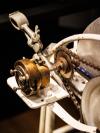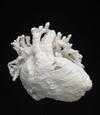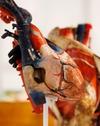Collection
Rijksmuseum Boerhaave’s collections reflect five centuries of scientific history in the Netherlands and embody the essence of science: curiosity, courage, creativity, and perseverance.
Rijksmuseum Boerhaave holds a unique collection of approximately 126,000 objects, books, prints, and images. Among the highlights are for example: the microscopes of Antoni van Leeuwenhoek, Christiaan Huygens' first pendulum clock, the world’s oldest heliocentric planetarium, anatomical preparations, items from Dutch Nobel Prize winners, and more.
Extraordinary Collection
Marvel at Einstein’s fountain pen, the first dialysis machine by Willem Kolff, and Maria Sybilla Merian’s Surinam Insects Book. We also feature more recent items, like the first administered COVID-19 vaccine, the qubit (the building block of quantum computers), an artificial pancreas, and data from the first discovered black hole.

This is one of the most important scientific and medical history collections in the world
Current Collecting
Rijksmuseum Boerhaave continues to expand its collection with objects that represent modern science and medicine. Recent acquisitions include a 3D-printed child’s heart, a prototype ventilator, and the first COVID-19 vaccine used in the Netherlands. This collection, already filled with remarkable medical and scientific objects, continues to grow with today’s major innovations.

Collecting for the Future
By collecting what is relevant now, the museum preserves the history of modern discoveries and technologies. The new collection policy focuses on developments since 1900, such as information technology, imaging, and medical devices. While this poses challenges for management and conservation, it keeps the story of science vibrant and current.

Traditional Collecting
Besides Current Collecting and Collecting for the Future, Rijksmuseum Boerhaave continues to focus on classic collections, such as microscopes, telescopes, and anatomical models. These valuable pieces are not only fascinating to see, but also important for research. In addition, we collect archival materials and historical books.




